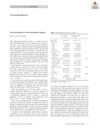Search
for
Sort by
Research
90-120 / 1000+ results
research The Comparison of Demographics and Comorbidities of Female Pattern Hair Loss According to the Clinical Subtype and Stage
Different stages and types of female hair loss are linked with age, menopause, high blood pressure, and skin conditions like acne and hirsutism.

research Diagnosis, Manifestations, Laboratory Investigations, and Prognosis in Pediatric and Adult Cushing’s Disease in a Large Center in China
Children and adults with Cushing's disease show different symptoms and males have more severe cases; surgery outcomes can be predicted by certain factors.

research Pattern and Profile of Patients with Acne Vulgaris
Most acne patients were young males with face acne, with many experiencing worsening in summer and diet-related aggravation.

research Hormonal Acne: Leading to a Paradigm Shift in the Management of Acne
The article concludes that hormonal therapy is an effective long-term acne treatment, even for those without hormonal imbalances.

research Acne and Systemic Disease
Hormones, especially androgens, play a key role in acne, which can be a symptom of systemic diseases like PCOS and may require targeted treatment.

research Emerging Therapies for Acne Vulgaris
New acne treatments show promise as alternatives to traditional therapies.

research Current Concepts in the Pathogenesis and Treatment of Acne
Acne is caused by increased sebum, abnormal skin shedding, bacteria, and inflammation, not dirt; treatments vary from creams to antibiotics or isotretinoin, with severe cases needing a dermatologist's care.

research PCOS Management of Acne
Acne in PCOS can be managed with specific treatment strategies.

research Antiandrogens and Androgen Inhibitors in Dermatologic Treatments
Antiandrogens and androgen inhibitors like spironolactone, finasteride, and dutasteride can treat hair loss and skin conditions, but they have risks and side effects, including potential harm to pregnant women and risks of cancer and heart issues. Herbal remedies also have antiandrogenic effects but lack safety validation.

research Serum Clusterin Level in Post-Adolescent Acne
Serum clusterin may play a key role in the inflammation and immune response in post-adolescent acne.

research Diagnosis and Management of the Dermatologic Manifestations of Polycystic Ovary Syndrome
The document concludes that accurate diagnosis and personalized treatment are important for skin problems in women with PCOS.

research Effective Treatment of Skin and Metabolic Manifestations of Hyperandrogenism: A Comprehensive Improvement of Quality of Life
Combined oral contraceptives improve skin, hormone levels, and quality of life in women with PCOS.

research Consensus on the Use of Oral Isotretinoin in Dermatology - Brazilian Society of Dermatology
The Brazilian Society of Dermatology agrees that oral isotretinoin is effective for acne and other skin conditions, and it's safe when monitored, but more research is needed on dosing and duration.

research Cutaneous Manifestations of Polycystic Ovary Syndrome
Skin problems like acne and excess hair in PCOS are common and linked to being overweight.

research Ethnic Hair Disorders: Diagnosis and Management
Understanding and treating hair disorders in different ethnic groups requires knowledge of specific hair care practices and hair characteristics.

research Management of Hirsutism Associated With Obese PCOD: A Case Report
Ayurvedic treatment, exercise, and a healthy diet can effectively manage PCOD symptoms.

research Polycystic Ovarian Syndrome: The Androgenized Adolescent
The document concludes that PCOS in adolescents is complex and requires comprehensive care to manage its symptoms and associated health risks.

research Insulin Resistance and Chronic Inflammatory Dermatoses
Insulin resistance significantly contributes to the development and severity of certain chronic skin diseases.

research Acne Development in Male Androgenetic Alopecia
Acne is more common in men with male pattern baldness due to increased hormone levels.

research Managing Acne in Individuals with Polycystic Ovarian Syndrome
Effective acne management in PCOS includes hormone therapy, metformin, isotretinoin, weight loss, diet, exercise, and personalized treatment plans.

research Drug-Induced Acne: Causes, Diagnosis, and Treatment
Some medications can cause acne, and stopping these drugs is the main treatment.

research Acne in Dark Skin: Prevalence, Presentation, and Treatment
Acne in dark skin is influenced by environmental factors and can lead to hyperpigmentation, with various treatment options available.

research Evaluation and Treatment of Male and Female Pattern Hair Loss
Early diagnosis and treatment, using finasteride, minoxidil, or hair transplantation, improves hair loss outcomes.

research Central Hair Loss in African American Women: Incidence and Potential Risk Factors
Some African American women's central scalp hair loss is linked to genetics and past fungal scalp infections, with more research needed on other causes.

research What Does Acne Genetics Teach Us About Disease Pathogenesis?
Acne is significantly influenced by genetics, and understanding its genetic basis could lead to better, targeted treatments.

research Female Pattern Hair Loss: Causes, Diagnosis, and Treatment Options
FPHL causes hair loss in women due to genetics and hormones; minoxidil and anti-androgens are treatments, and early intervention is advised.

research Contraceptive Use in Acne
Hormonal contraceptives can help treat acne by affecting sebum production and androgen levels.

research An Update on Diagnosis and Treatment of Female Pattern Hair Loss
Updated treatments for female hair loss include minoxidil, antiandrogens, hair transplants, and light therapy.

research Use of Oral Contraceptives in the Management of Acne
Birth control pills with low-dose estrogen and antiandrogenic progestins can effectively treat acne.